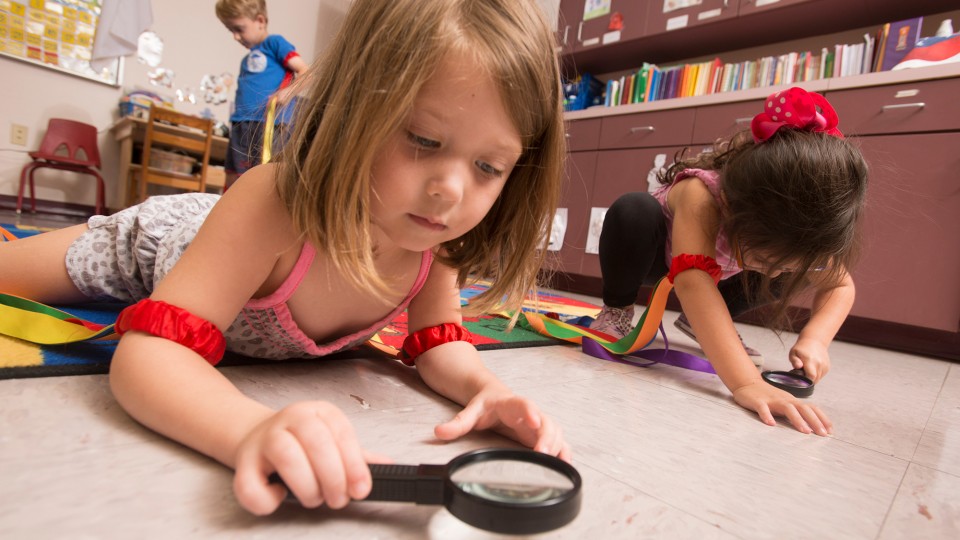The quality of pre-K makes a difference
- October 5, 2015
- / Reggie Dogan
- / education

Claire Hedgepeth uses a magnifying glass to investigate along with others in a pre-K class at Myrtle Grove Baptist Church Pre-School Learning Center. Many educators consider pre-K essential to get kids ready to learn. Almost 72 percent of the 4-year-olds in Escambia participate in voluntary pre-K programs. / Photo by Michael Spooneybarger
In almost every discussion about education these days, the conversation invariably comes back to early learning.
Early childhood education has become the buzz across the country. From birth to age 4 is crucial to a child’s development and future endeavors, volumes of research show.
But now comes a new study that raises serious doubts about the benefits of preschool.
In a New York Times opinion piece, David L Kirp,draws attention to a just-released study in Tennessee that showed gains children made in preschool fizzled by the time they reached kindergarten.
As part of the Studer Community Institute’s goal to improve quality of life, kindergarten readiness emerged as one of 16 key metrics to gauge progress and identify areas that need improvement.
In Escambia County, 66.2 percent of 5-year-olds scored ready for kindergarten when evaluated in the first month of the school in 2013-14, while Santa Rosa’s readiness rate was 81 percent.
Kirp, a professor of public policy at the University of California, Berkeley, and a senior fellow at the Learning Policy Institute, in his op-ed, “Does Pre-K Make a Difference?” appears to turn on its head the previous studies that show the positive effects of early childhood education.
But Kirp's New York Times article highlights the disparities in early education between run-of-the-mill preschool programs that fail children and “high-quality” preschool programs that teach and help them learn. While the Tennessee study showed preschool as overrated and ineffective, an analysis of early learning in Boston painted a completely different picture.
“What’s the difference between Boston and Tennessee? In a word quality, ‘Tennessee doesn’t have a coherent vision,’ Dale Farran, a Vanderbilt professor and the Tennessee study’s co-author told Kirp. 'Left to their own devices, each teacher is inventing pre-K on her own.'”
Substantive research clearly demonstrates that high-quality, developmentally appropriate early childhood programs produce short- and long-term positive effects on children’s cognitive and social development.
The highest-quality pre-kindergarten programs can produce up to a year of additional learning. Children see gains throughout their lives — from improved graduation rates and earnings to decreased rates of crime and adolescent pregnancy.
But too many early childhood classrooms and family childcare homes are of mediocre or poor quality. An alarming number of infants and toddlers are found in unsafe conditions.
Children in school with fewer resources, a higher percentage of teachers whot are new or have emergency certificates, and lacking parental involvement in their education are not receiving the high-quality early education they need and deserve.
People everywhere are writing and talking more about early education than ever before. But the results on the benefits of preschool are mixed. Academic achievement, of course, is one of the main benefits of early childhood learning.
What’s critically important is to provide high-quality early learning for all children, but unfortunately the children who most need high-quality learning have the least access.
 CivicCon launches with a look at good growth in cities
CivicCon launches with a look at good growth in cities
 Building stronger brains one baby, one parent at a time
Building stronger brains one baby, one parent at a time
 SCI debuts commercial on Early Learning City
SCI debuts commercial on Early Learning City
 Entrecon: World class speakers and an opportunity to sharpen skills
Entrecon: World class speakers and an opportunity to sharpen skills
 PYP Quality of Life survey 2017
PYP Quality of Life survey 2017
 EntreCon Pensacola 2016: A look back
EntreCon Pensacola 2016: A look back
 Leadership tip: getting better employee takeaways
Leadership tip: getting better employee takeaways
 Leadership tip: be interested instead of interesting
Leadership tip: be interested instead of interesting
 Leadership tip: delivering difficult messages
Leadership tip: delivering difficult messages
 Brain Bags boost Arc, Early Childhood Court programs
Brain Bags boost Arc, Early Childhood Court programs